Analyzing Competition Law in Hong Kong: Private Enforcement Challenges
VerifiedAdded on 2022/08/22
|18
|3919
|12
Thesis and Dissertation
AI Summary
This dissertation examines the efficiency of Hong Kong's competition law in the absence of private enforcement. The study begins with an introduction outlining the importance of competition law in Hong Kong, emphasizing its role in maintaining a fair market environment. The research question investigates whether Hong Kong can effectively police competition law without private enforcement. The aims and objectives include determining the appropriate research design, identifying how various sources have elaborated on the issue of competition law in Hong Kong, to come up with a common argument that shows how Hong Kong has been working hard to maintain the law of competition without support from other elements such as the private sector, and assessing Hong Kong's methods of policing to administer competition law. The literature review covers the historical context of competition law, its implementation in Hong Kong, and the three main prohibitions covered by the Competition Ordinance: anti-competitive agreements, abuse of substantial market power, and mergers that lessen competition. The review also discusses the views of private sector challenges, the role of economies of scale, and the importance of client surplus over manufacturer's surplus. The methodology section outlines the use of secondary data to analyze socio-economic views related to competition law in Hong Kong. The study concludes by summarizing the key findings and their implications for competition law enforcement in Hong Kong.
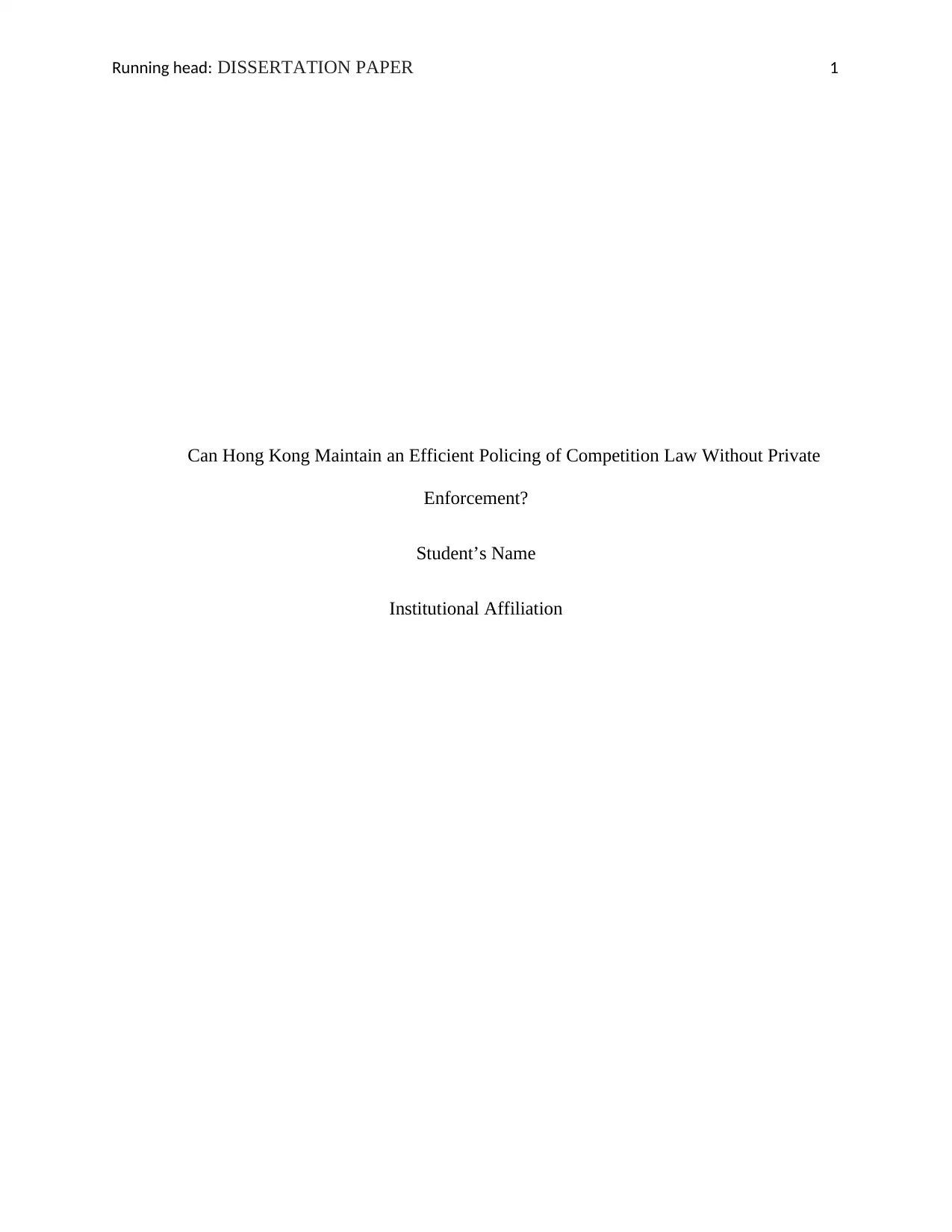
Running head: DISSERTATION PAPER 1
Can Hong Kong Maintain an Efficient Policing of Competition Law Without Private
Enforcement?
Student’s Name
Institutional Affiliation
Can Hong Kong Maintain an Efficient Policing of Competition Law Without Private
Enforcement?
Student’s Name
Institutional Affiliation
Paraphrase This Document
Need a fresh take? Get an instant paraphrase of this document with our AI Paraphraser
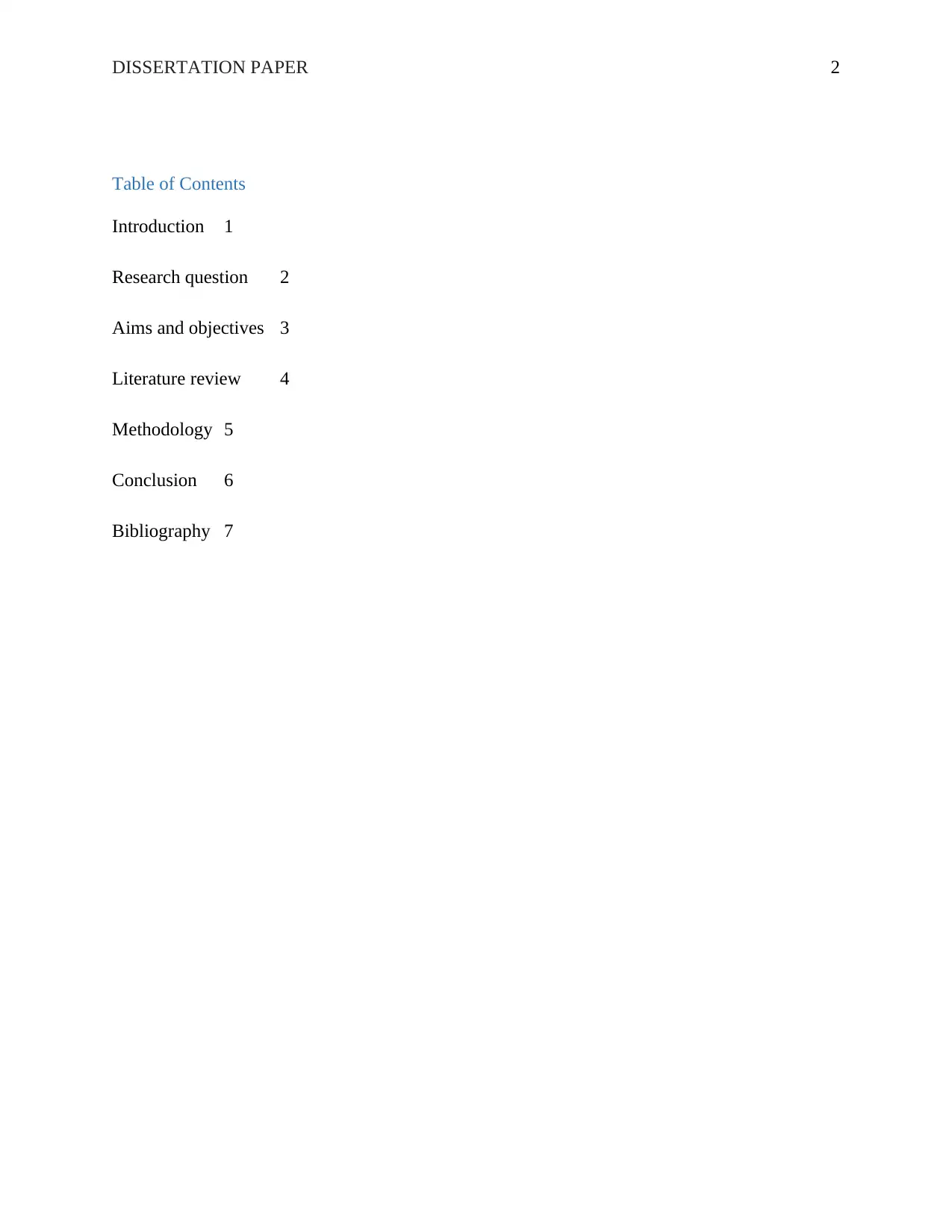
DISSERTATION PAPER 2
Table of Contents
Introduction 1
Research question 2
Aims and objectives 3
Literature review 4
Methodology 5
Conclusion 6
Bibliography 7
Table of Contents
Introduction 1
Research question 2
Aims and objectives 3
Literature review 4
Methodology 5
Conclusion 6
Bibliography 7
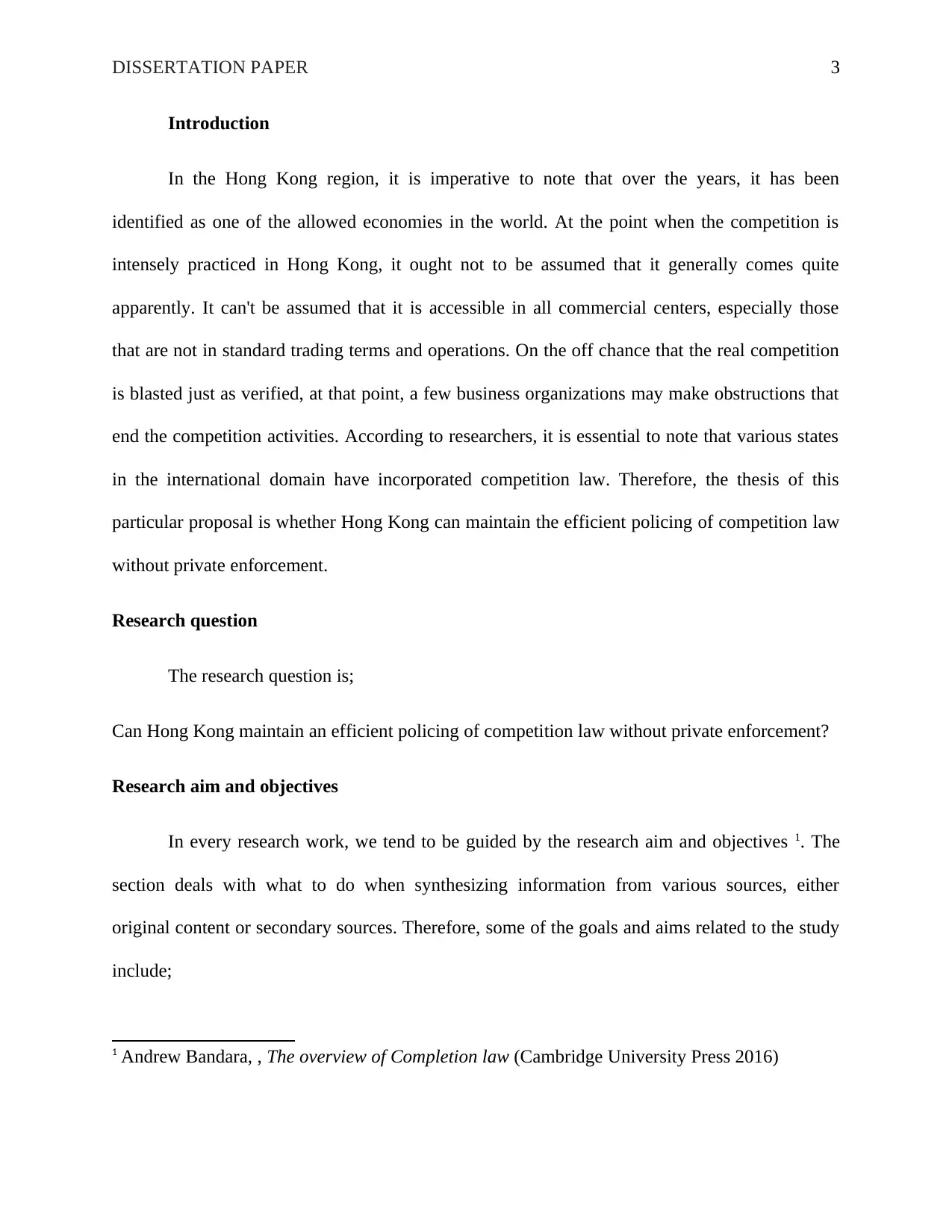
DISSERTATION PAPER 3
Introduction
In the Hong Kong region, it is imperative to note that over the years, it has been
identified as one of the allowed economies in the world. At the point when the competition is
intensely practiced in Hong Kong, it ought not to be assumed that it generally comes quite
apparently. It can't be assumed that it is accessible in all commercial centers, especially those
that are not in standard trading terms and operations. On the off chance that the real competition
is blasted just as verified, at that point, a few business organizations may make obstructions that
end the competition activities. According to researchers, it is essential to note that various states
in the international domain have incorporated competition law. Therefore, the thesis of this
particular proposal is whether Hong Kong can maintain the efficient policing of competition law
without private enforcement.
Research question
The research question is;
Can Hong Kong maintain an efficient policing of competition law without private enforcement?
Research aim and objectives
In every research work, we tend to be guided by the research aim and objectives 1. The
section deals with what to do when synthesizing information from various sources, either
original content or secondary sources. Therefore, some of the goals and aims related to the study
include;
1 Andrew Bandara, , The overview of Completion law (Cambridge University Press 2016)
Introduction
In the Hong Kong region, it is imperative to note that over the years, it has been
identified as one of the allowed economies in the world. At the point when the competition is
intensely practiced in Hong Kong, it ought not to be assumed that it generally comes quite
apparently. It can't be assumed that it is accessible in all commercial centers, especially those
that are not in standard trading terms and operations. On the off chance that the real competition
is blasted just as verified, at that point, a few business organizations may make obstructions that
end the competition activities. According to researchers, it is essential to note that various states
in the international domain have incorporated competition law. Therefore, the thesis of this
particular proposal is whether Hong Kong can maintain the efficient policing of competition law
without private enforcement.
Research question
The research question is;
Can Hong Kong maintain an efficient policing of competition law without private enforcement?
Research aim and objectives
In every research work, we tend to be guided by the research aim and objectives 1. The
section deals with what to do when synthesizing information from various sources, either
original content or secondary sources. Therefore, some of the goals and aims related to the study
include;
1 Andrew Bandara, , The overview of Completion law (Cambridge University Press 2016)
⊘ This is a preview!⊘
Do you want full access?
Subscribe today to unlock all pages.

Trusted by 1+ million students worldwide
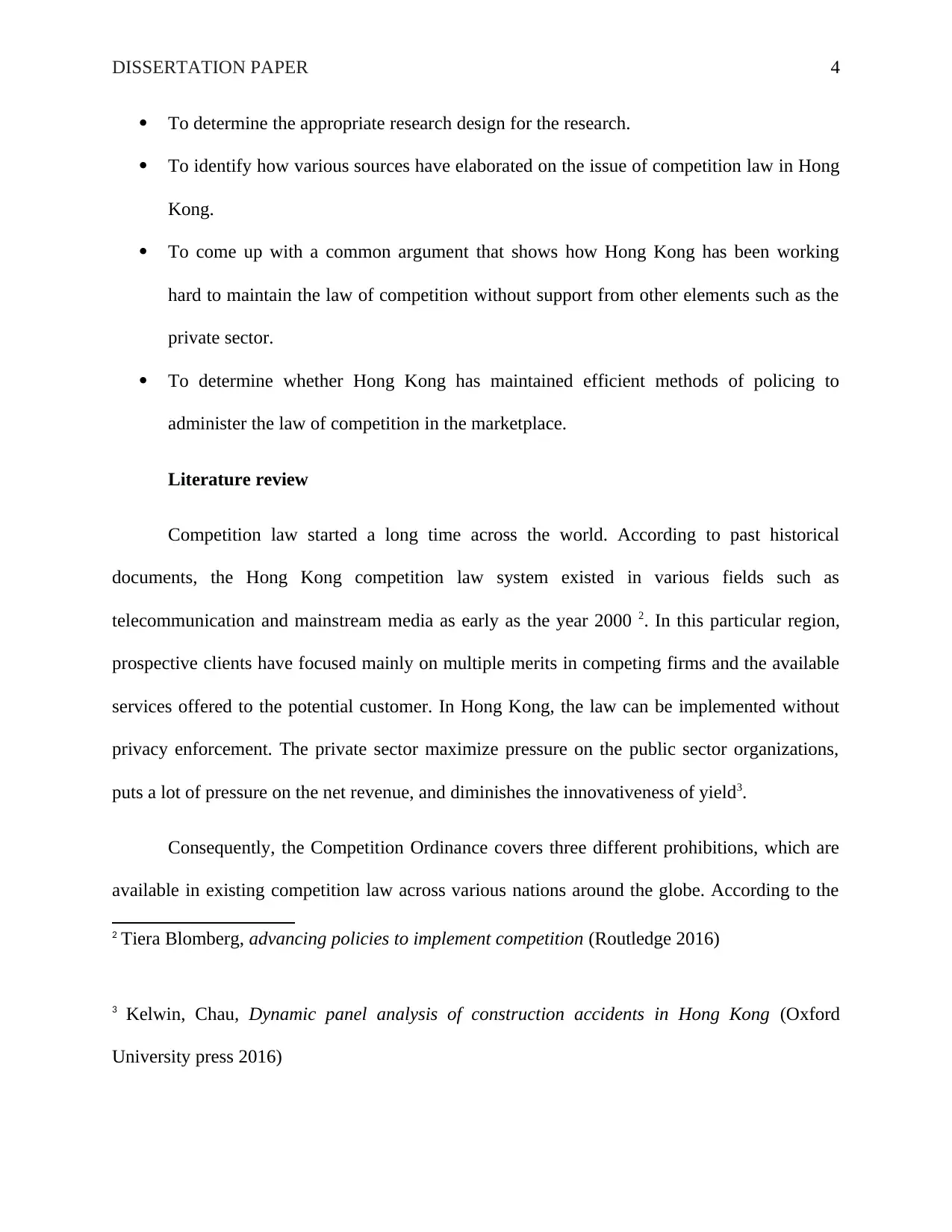
DISSERTATION PAPER 4
To determine the appropriate research design for the research.
To identify how various sources have elaborated on the issue of competition law in Hong
Kong.
To come up with a common argument that shows how Hong Kong has been working
hard to maintain the law of competition without support from other elements such as the
private sector.
To determine whether Hong Kong has maintained efficient methods of policing to
administer the law of competition in the marketplace.
Literature review
Competition law started a long time across the world. According to past historical
documents, the Hong Kong competition law system existed in various fields such as
telecommunication and mainstream media as early as the year 2000 2. In this particular region,
prospective clients have focused mainly on multiple merits in competing firms and the available
services offered to the potential customer. In Hong Kong, the law can be implemented without
privacy enforcement. The private sector maximize pressure on the public sector organizations,
puts a lot of pressure on the net revenue, and diminishes the innovativeness of yield3.
Consequently, the Competition Ordinance covers three different prohibitions, which are
available in existing competition law across various nations around the globe. According to the
2 Tiera Blomberg, advancing policies to implement competition (Routledge 2016)
3 Kelwin, Chau, Dynamic panel analysis of construction accidents in Hong Kong (Oxford
University press 2016)
To determine the appropriate research design for the research.
To identify how various sources have elaborated on the issue of competition law in Hong
Kong.
To come up with a common argument that shows how Hong Kong has been working
hard to maintain the law of competition without support from other elements such as the
private sector.
To determine whether Hong Kong has maintained efficient methods of policing to
administer the law of competition in the marketplace.
Literature review
Competition law started a long time across the world. According to past historical
documents, the Hong Kong competition law system existed in various fields such as
telecommunication and mainstream media as early as the year 2000 2. In this particular region,
prospective clients have focused mainly on multiple merits in competing firms and the available
services offered to the potential customer. In Hong Kong, the law can be implemented without
privacy enforcement. The private sector maximize pressure on the public sector organizations,
puts a lot of pressure on the net revenue, and diminishes the innovativeness of yield3.
Consequently, the Competition Ordinance covers three different prohibitions, which are
available in existing competition law across various nations around the globe. According to the
2 Tiera Blomberg, advancing policies to implement competition (Routledge 2016)
3 Kelwin, Chau, Dynamic panel analysis of construction accidents in Hong Kong (Oxford
University press 2016)
Paraphrase This Document
Need a fresh take? Get an instant paraphrase of this document with our AI Paraphraser
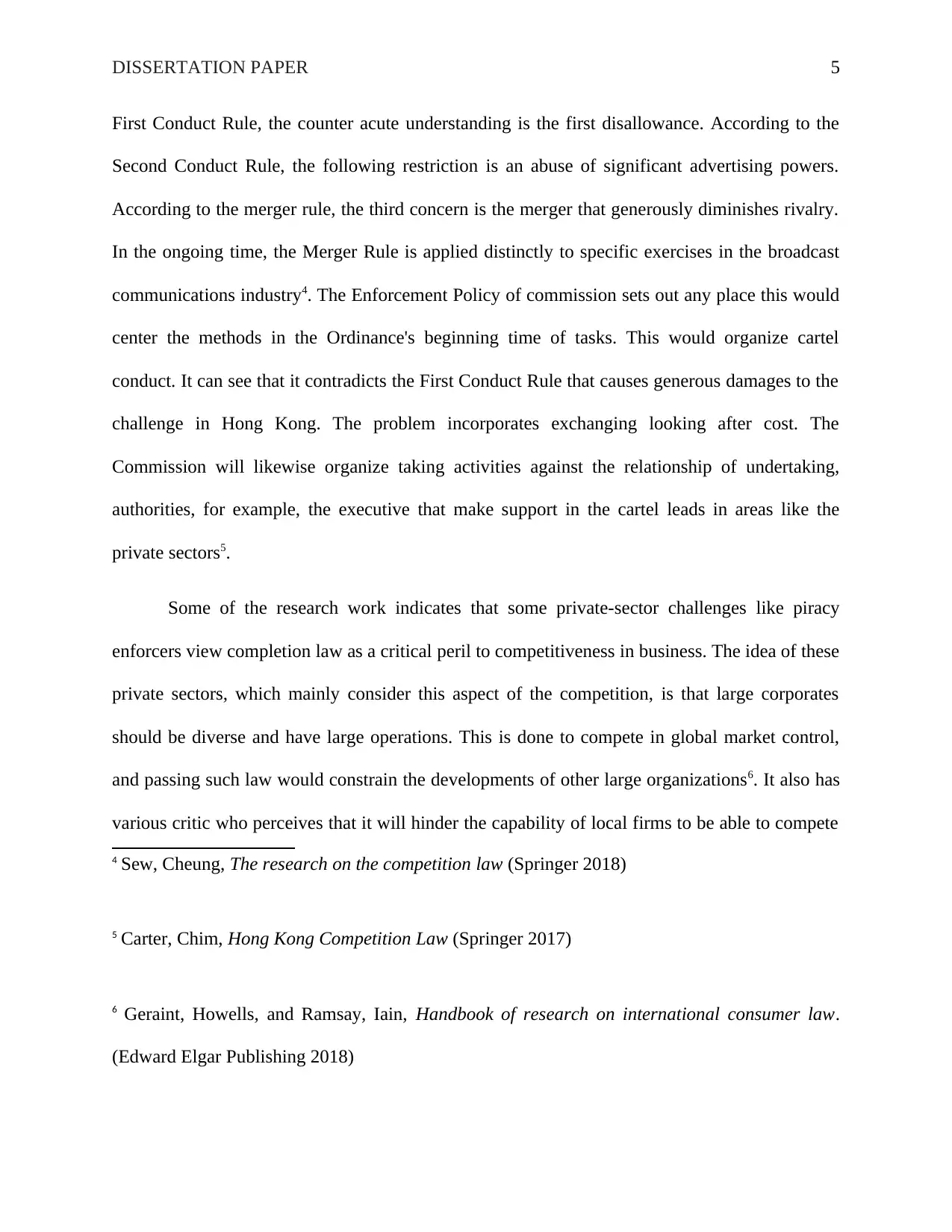
DISSERTATION PAPER 5
First Conduct Rule, the counter acute understanding is the first disallowance. According to the
Second Conduct Rule, the following restriction is an abuse of significant advertising powers.
According to the merger rule, the third concern is the merger that generously diminishes rivalry.
In the ongoing time, the Merger Rule is applied distinctly to specific exercises in the broadcast
communications industry4. The Enforcement Policy of commission sets out any place this would
center the methods in the Ordinance's beginning time of tasks. This would organize cartel
conduct. It can see that it contradicts the First Conduct Rule that causes generous damages to the
challenge in Hong Kong. The problem incorporates exchanging looking after cost. The
Commission will likewise organize taking activities against the relationship of undertaking,
authorities, for example, the executive that make support in the cartel leads in areas like the
private sectors5.
Some of the research work indicates that some private-sector challenges like piracy
enforcers view completion law as a critical peril to competitiveness in business. The idea of these
private sectors, which mainly consider this aspect of the competition, is that large corporates
should be diverse and have large operations. This is done to compete in global market control,
and passing such law would constrain the developments of other large organizations6. It also has
various critic who perceives that it will hinder the capability of local firms to be able to compete
4 Sew, Cheung, The research on the competition law (Springer 2018)
5 Carter, Chim, Hong Kong Competition Law (Springer 2017)
6 Geraint, Howells, and Ramsay, Iain, Handbook of research on international consumer law.
(Edward Elgar Publishing 2018)
First Conduct Rule, the counter acute understanding is the first disallowance. According to the
Second Conduct Rule, the following restriction is an abuse of significant advertising powers.
According to the merger rule, the third concern is the merger that generously diminishes rivalry.
In the ongoing time, the Merger Rule is applied distinctly to specific exercises in the broadcast
communications industry4. The Enforcement Policy of commission sets out any place this would
center the methods in the Ordinance's beginning time of tasks. This would organize cartel
conduct. It can see that it contradicts the First Conduct Rule that causes generous damages to the
challenge in Hong Kong. The problem incorporates exchanging looking after cost. The
Commission will likewise organize taking activities against the relationship of undertaking,
authorities, for example, the executive that make support in the cartel leads in areas like the
private sectors5.
Some of the research work indicates that some private-sector challenges like piracy
enforcers view completion law as a critical peril to competitiveness in business. The idea of these
private sectors, which mainly consider this aspect of the competition, is that large corporates
should be diverse and have large operations. This is done to compete in global market control,
and passing such law would constrain the developments of other large organizations6. It also has
various critic who perceives that it will hinder the capability of local firms to be able to compete
4 Sew, Cheung, The research on the competition law (Springer 2018)
5 Carter, Chim, Hong Kong Competition Law (Springer 2017)
6 Geraint, Howells, and Ramsay, Iain, Handbook of research on international consumer law.
(Edward Elgar Publishing 2018)
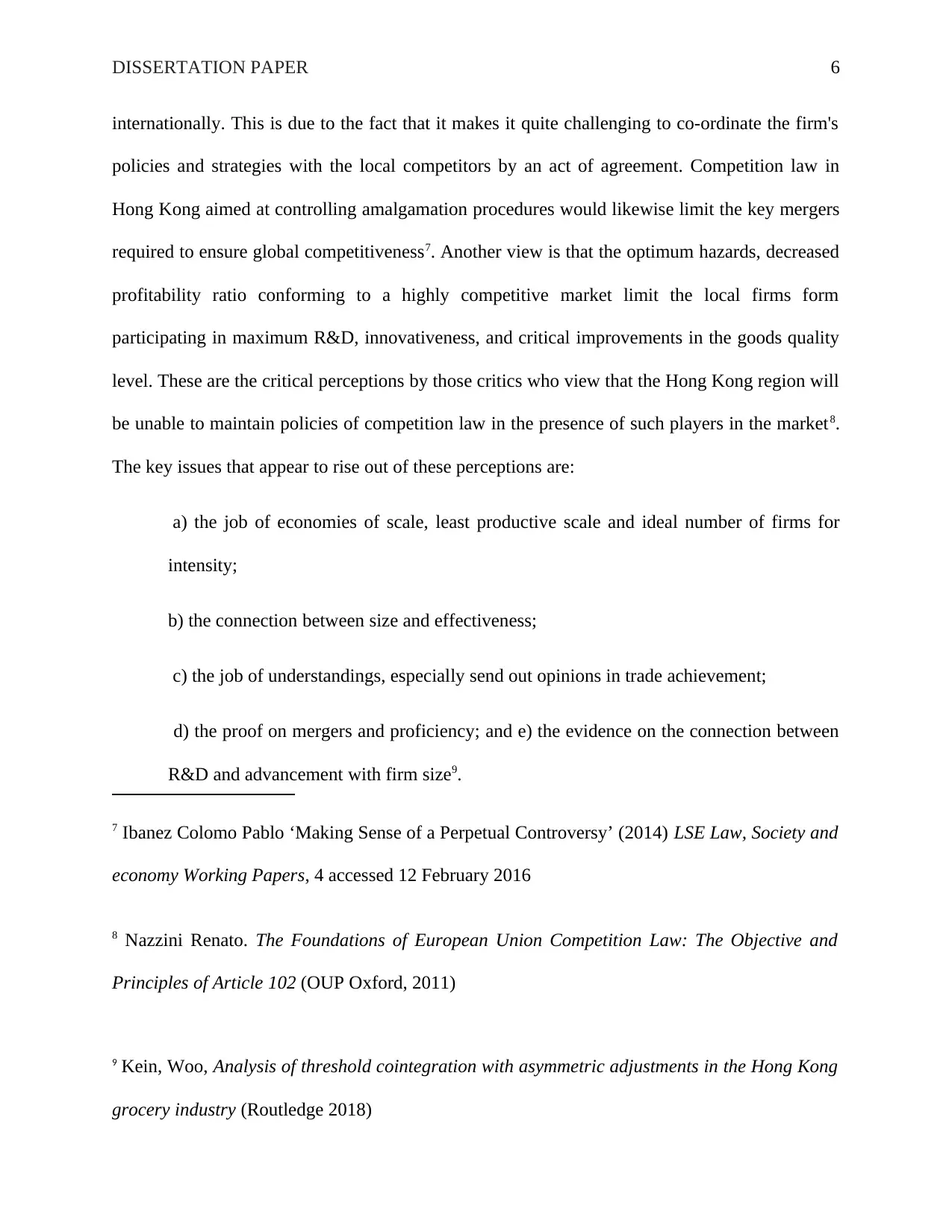
DISSERTATION PAPER 6
internationally. This is due to the fact that it makes it quite challenging to co-ordinate the firm's
policies and strategies with the local competitors by an act of agreement. Competition law in
Hong Kong aimed at controlling amalgamation procedures would likewise limit the key mergers
required to ensure global competitiveness7. Another view is that the optimum hazards, decreased
profitability ratio conforming to a highly competitive market limit the local firms form
participating in maximum R&D, innovativeness, and critical improvements in the goods quality
level. These are the critical perceptions by those critics who view that the Hong Kong region will
be unable to maintain policies of competition law in the presence of such players in the market8.
The key issues that appear to rise out of these perceptions are:
a) the job of economies of scale, least productive scale and ideal number of firms for
intensity;
b) the connection between size and effectiveness;
c) the job of understandings, especially send out opinions in trade achievement;
d) the proof on mergers and proficiency; and e) the evidence on the connection between
R&D and advancement with firm size9.
7 Ibanez Colomo Pablo ‘Making Sense of a Perpetual Controversy’ (2014) LSE Law, Society and
economy Working Papers, 4 accessed 12 February 2016
8 Nazzini Renato. The Foundations of European Union Competition Law: The Objective and
Principles of Article 102 (OUP Oxford, 2011)
9 Kein, Woo, Analysis of threshold cointegration with asymmetric adjustments in the Hong Kong
grocery industry (Routledge 2018)
internationally. This is due to the fact that it makes it quite challenging to co-ordinate the firm's
policies and strategies with the local competitors by an act of agreement. Competition law in
Hong Kong aimed at controlling amalgamation procedures would likewise limit the key mergers
required to ensure global competitiveness7. Another view is that the optimum hazards, decreased
profitability ratio conforming to a highly competitive market limit the local firms form
participating in maximum R&D, innovativeness, and critical improvements in the goods quality
level. These are the critical perceptions by those critics who view that the Hong Kong region will
be unable to maintain policies of competition law in the presence of such players in the market8.
The key issues that appear to rise out of these perceptions are:
a) the job of economies of scale, least productive scale and ideal number of firms for
intensity;
b) the connection between size and effectiveness;
c) the job of understandings, especially send out opinions in trade achievement;
d) the proof on mergers and proficiency; and e) the evidence on the connection between
R&D and advancement with firm size9.
7 Ibanez Colomo Pablo ‘Making Sense of a Perpetual Controversy’ (2014) LSE Law, Society and
economy Working Papers, 4 accessed 12 February 2016
8 Nazzini Renato. The Foundations of European Union Competition Law: The Objective and
Principles of Article 102 (OUP Oxford, 2011)
9 Kein, Woo, Analysis of threshold cointegration with asymmetric adjustments in the Hong Kong
grocery industry (Routledge 2018)
⊘ This is a preview!⊘
Do you want full access?
Subscribe today to unlock all pages.

Trusted by 1+ million students worldwide
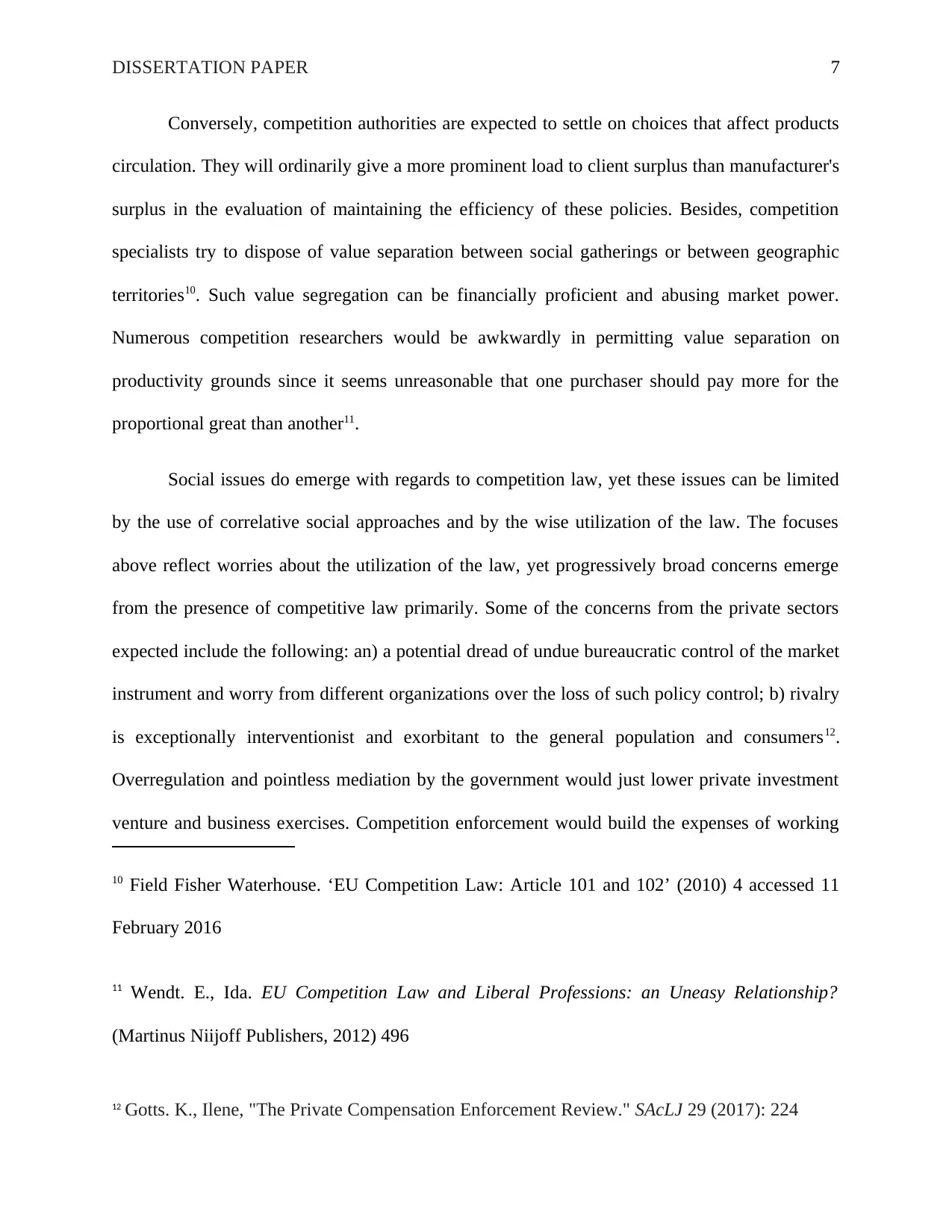
DISSERTATION PAPER 7
Conversely, competition authorities are expected to settle on choices that affect products
circulation. They will ordinarily give a more prominent load to client surplus than manufacturer's
surplus in the evaluation of maintaining the efficiency of these policies. Besides, competition
specialists try to dispose of value separation between social gatherings or between geographic
territories10. Such value segregation can be financially proficient and abusing market power.
Numerous competition researchers would be awkwardly in permitting value separation on
productivity grounds since it seems unreasonable that one purchaser should pay more for the
proportional great than another11.
Social issues do emerge with regards to competition law, yet these issues can be limited
by the use of correlative social approaches and by the wise utilization of the law. The focuses
above reflect worries about the utilization of the law, yet progressively broad concerns emerge
from the presence of competitive law primarily. Some of the concerns from the private sectors
expected include the following: an) a potential dread of undue bureaucratic control of the market
instrument and worry from different organizations over the loss of such policy control; b) rivalry
is exceptionally interventionist and exorbitant to the general population and consumers12.
Overregulation and pointless mediation by the government would just lower private investment
venture and business exercises. Competition enforcement would build the expenses of working
10 Field Fisher Waterhouse. ‘EU Competition Law: Article 101 and 102’ (2010) 4 accessed 11
February 2016
11 Wendt. E., Ida. EU Competition Law and Liberal Professions: an Uneasy Relationship?
(Martinus Niijoff Publishers, 2012) 496
12 Gotts. K., Ilene, "The Private Compensation Enforcement Review." SAcLJ 29 (2017): 224
Conversely, competition authorities are expected to settle on choices that affect products
circulation. They will ordinarily give a more prominent load to client surplus than manufacturer's
surplus in the evaluation of maintaining the efficiency of these policies. Besides, competition
specialists try to dispose of value separation between social gatherings or between geographic
territories10. Such value segregation can be financially proficient and abusing market power.
Numerous competition researchers would be awkwardly in permitting value separation on
productivity grounds since it seems unreasonable that one purchaser should pay more for the
proportional great than another11.
Social issues do emerge with regards to competition law, yet these issues can be limited
by the use of correlative social approaches and by the wise utilization of the law. The focuses
above reflect worries about the utilization of the law, yet progressively broad concerns emerge
from the presence of competitive law primarily. Some of the concerns from the private sectors
expected include the following: an) a potential dread of undue bureaucratic control of the market
instrument and worry from different organizations over the loss of such policy control; b) rivalry
is exceptionally interventionist and exorbitant to the general population and consumers12.
Overregulation and pointless mediation by the government would just lower private investment
venture and business exercises. Competition enforcement would build the expenses of working
10 Field Fisher Waterhouse. ‘EU Competition Law: Article 101 and 102’ (2010) 4 accessed 11
February 2016
11 Wendt. E., Ida. EU Competition Law and Liberal Professions: an Uneasy Relationship?
(Martinus Niijoff Publishers, 2012) 496
12 Gotts. K., Ilene, "The Private Compensation Enforcement Review." SAcLJ 29 (2017): 224
Paraphrase This Document
Need a fresh take? Get an instant paraphrase of this document with our AI Paraphraser
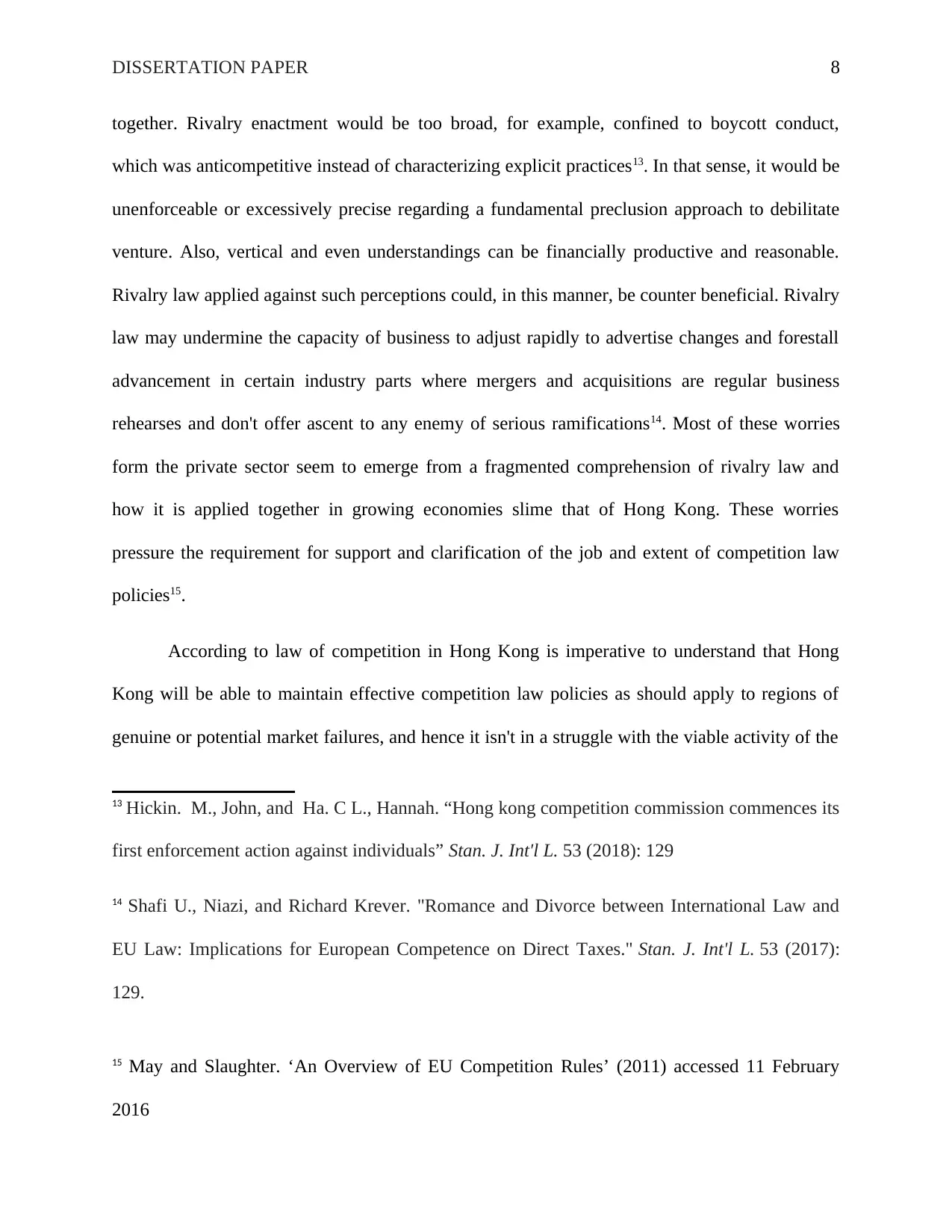
DISSERTATION PAPER 8
together. Rivalry enactment would be too broad, for example, confined to boycott conduct,
which was anticompetitive instead of characterizing explicit practices13. In that sense, it would be
unenforceable or excessively precise regarding a fundamental preclusion approach to debilitate
venture. Also, vertical and even understandings can be financially productive and reasonable.
Rivalry law applied against such perceptions could, in this manner, be counter beneficial. Rivalry
law may undermine the capacity of business to adjust rapidly to advertise changes and forestall
advancement in certain industry parts where mergers and acquisitions are regular business
rehearses and don't offer ascent to any enemy of serious ramifications14. Most of these worries
form the private sector seem to emerge from a fragmented comprehension of rivalry law and
how it is applied together in growing economies slime that of Hong Kong. These worries
pressure the requirement for support and clarification of the job and extent of competition law
policies15.
According to law of competition in Hong Kong is imperative to understand that Hong
Kong will be able to maintain effective competition law policies as should apply to regions of
genuine or potential market failures, and hence it isn't in a struggle with the viable activity of the
13 Hickin. M., John, and Ha. C L., Hannah. “Hong kong competition commission commences its
first enforcement action against individuals” Stan. J. Int'l L. 53 (2018): 129
14 Shafi U., Niazi, and Richard Krever. "Romance and Divorce between International Law and
EU Law: Implications for European Competence on Direct Taxes." Stan. J. Int'l L. 53 (2017):
129.
15 May and Slaughter. ‘An Overview of EU Competition Rules’ (2011) accessed 11 February
2016
together. Rivalry enactment would be too broad, for example, confined to boycott conduct,
which was anticompetitive instead of characterizing explicit practices13. In that sense, it would be
unenforceable or excessively precise regarding a fundamental preclusion approach to debilitate
venture. Also, vertical and even understandings can be financially productive and reasonable.
Rivalry law applied against such perceptions could, in this manner, be counter beneficial. Rivalry
law may undermine the capacity of business to adjust rapidly to advertise changes and forestall
advancement in certain industry parts where mergers and acquisitions are regular business
rehearses and don't offer ascent to any enemy of serious ramifications14. Most of these worries
form the private sector seem to emerge from a fragmented comprehension of rivalry law and
how it is applied together in growing economies slime that of Hong Kong. These worries
pressure the requirement for support and clarification of the job and extent of competition law
policies15.
According to law of competition in Hong Kong is imperative to understand that Hong
Kong will be able to maintain effective competition law policies as should apply to regions of
genuine or potential market failures, and hence it isn't in a struggle with the viable activity of the
13 Hickin. M., John, and Ha. C L., Hannah. “Hong kong competition commission commences its
first enforcement action against individuals” Stan. J. Int'l L. 53 (2018): 129
14 Shafi U., Niazi, and Richard Krever. "Romance and Divorce between International Law and
EU Law: Implications for European Competence on Direct Taxes." Stan. J. Int'l L. 53 (2017):
129.
15 May and Slaughter. ‘An Overview of EU Competition Rules’ (2011) accessed 11 February
2016
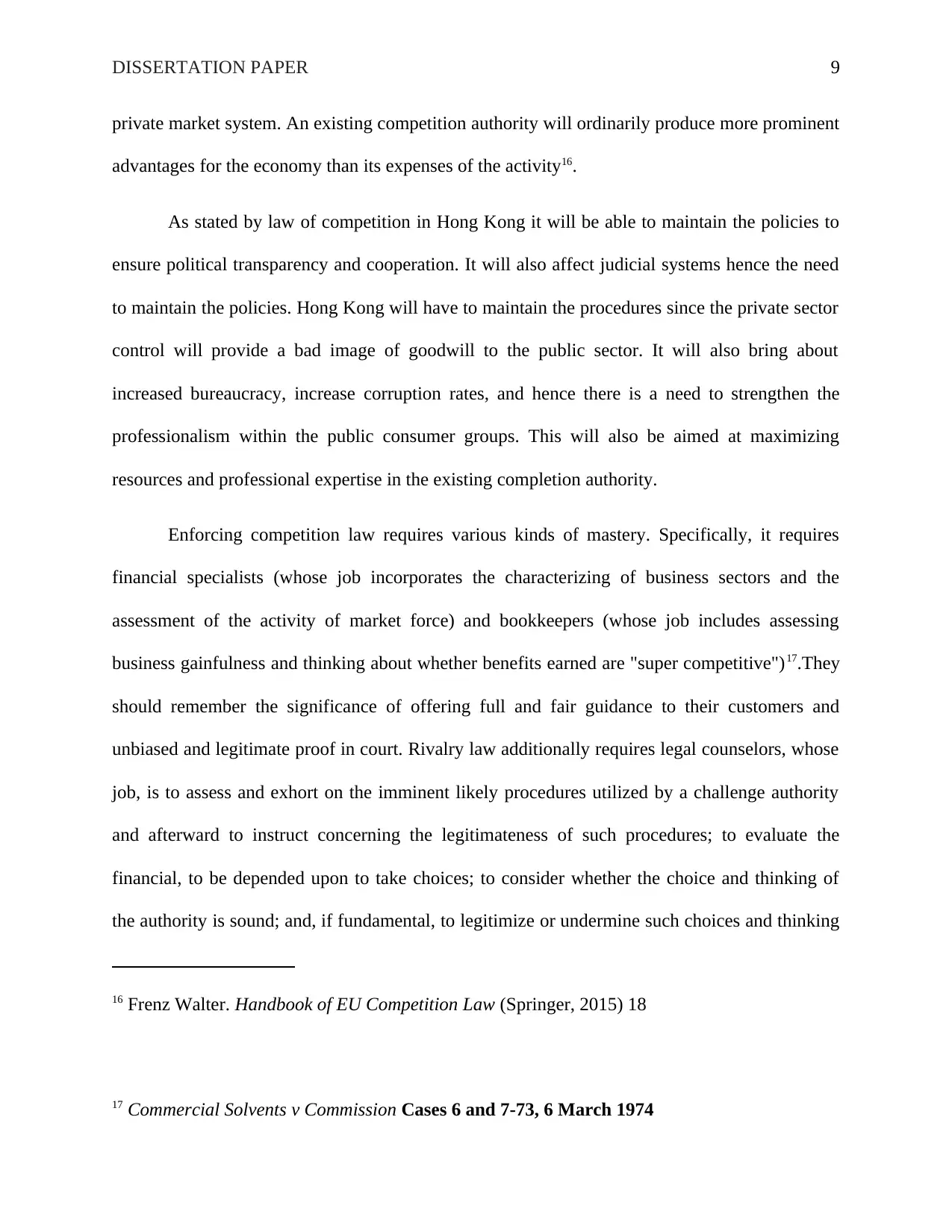
DISSERTATION PAPER 9
private market system. An existing competition authority will ordinarily produce more prominent
advantages for the economy than its expenses of the activity16.
As stated by law of competition in Hong Kong it will be able to maintain the policies to
ensure political transparency and cooperation. It will also affect judicial systems hence the need
to maintain the policies. Hong Kong will have to maintain the procedures since the private sector
control will provide a bad image of goodwill to the public sector. It will also bring about
increased bureaucracy, increase corruption rates, and hence there is a need to strengthen the
professionalism within the public consumer groups. This will also be aimed at maximizing
resources and professional expertise in the existing completion authority.
Enforcing competition law requires various kinds of mastery. Specifically, it requires
financial specialists (whose job incorporates the characterizing of business sectors and the
assessment of the activity of market force) and bookkeepers (whose job includes assessing
business gainfulness and thinking about whether benefits earned are "super competitive")17.They
should remember the significance of offering full and fair guidance to their customers and
unbiased and legitimate proof in court. Rivalry law additionally requires legal counselors, whose
job, is to assess and exhort on the imminent likely procedures utilized by a challenge authority
and afterward to instruct concerning the legitimateness of such procedures; to evaluate the
financial, to be depended upon to take choices; to consider whether the choice and thinking of
the authority is sound; and, if fundamental, to legitimize or undermine such choices and thinking
16 Frenz Walter. Handbook of EU Competition Law (Springer, 2015) 18
17 Commercial Solvents v Commission Cases 6 and 7-73, 6 March 1974
private market system. An existing competition authority will ordinarily produce more prominent
advantages for the economy than its expenses of the activity16.
As stated by law of competition in Hong Kong it will be able to maintain the policies to
ensure political transparency and cooperation. It will also affect judicial systems hence the need
to maintain the policies. Hong Kong will have to maintain the procedures since the private sector
control will provide a bad image of goodwill to the public sector. It will also bring about
increased bureaucracy, increase corruption rates, and hence there is a need to strengthen the
professionalism within the public consumer groups. This will also be aimed at maximizing
resources and professional expertise in the existing completion authority.
Enforcing competition law requires various kinds of mastery. Specifically, it requires
financial specialists (whose job incorporates the characterizing of business sectors and the
assessment of the activity of market force) and bookkeepers (whose job includes assessing
business gainfulness and thinking about whether benefits earned are "super competitive")17.They
should remember the significance of offering full and fair guidance to their customers and
unbiased and legitimate proof in court. Rivalry law additionally requires legal counselors, whose
job, is to assess and exhort on the imminent likely procedures utilized by a challenge authority
and afterward to instruct concerning the legitimateness of such procedures; to evaluate the
financial, to be depended upon to take choices; to consider whether the choice and thinking of
the authority is sound; and, if fundamental, to legitimize or undermine such choices and thinking
16 Frenz Walter. Handbook of EU Competition Law (Springer, 2015) 18
17 Commercial Solvents v Commission Cases 6 and 7-73, 6 March 1974
⊘ This is a preview!⊘
Do you want full access?
Subscribe today to unlock all pages.

Trusted by 1+ million students worldwide
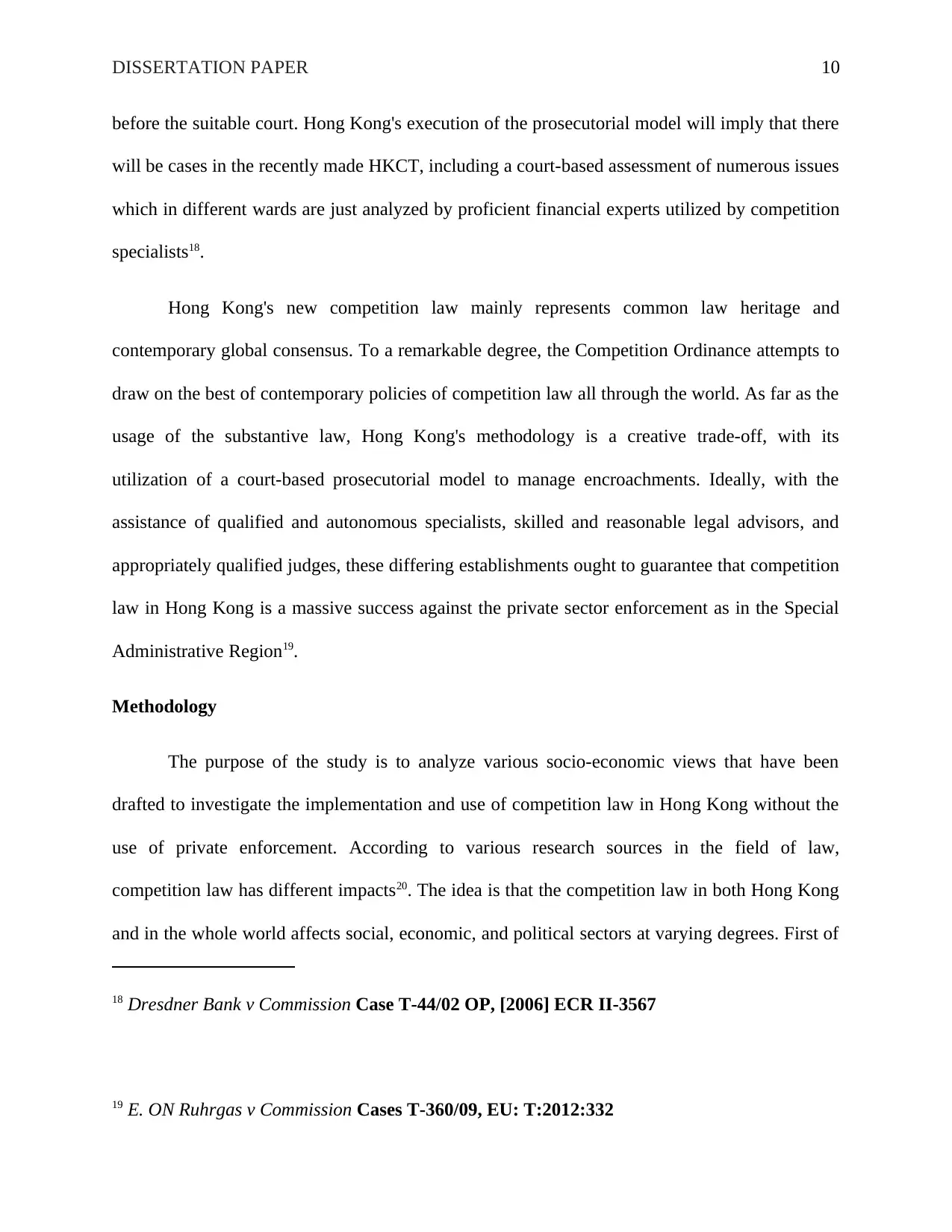
DISSERTATION PAPER 10
before the suitable court. Hong Kong's execution of the prosecutorial model will imply that there
will be cases in the recently made HKCT, including a court-based assessment of numerous issues
which in different wards are just analyzed by proficient financial experts utilized by competition
specialists18.
Hong Kong's new competition law mainly represents common law heritage and
contemporary global consensus. To a remarkable degree, the Competition Ordinance attempts to
draw on the best of contemporary policies of competition law all through the world. As far as the
usage of the substantive law, Hong Kong's methodology is a creative trade-off, with its
utilization of a court-based prosecutorial model to manage encroachments. Ideally, with the
assistance of qualified and autonomous specialists, skilled and reasonable legal advisors, and
appropriately qualified judges, these differing establishments ought to guarantee that competition
law in Hong Kong is a massive success against the private sector enforcement as in the Special
Administrative Region19.
Methodology
The purpose of the study is to analyze various socio-economic views that have been
drafted to investigate the implementation and use of competition law in Hong Kong without the
use of private enforcement. According to various research sources in the field of law,
competition law has different impacts20. The idea is that the competition law in both Hong Kong
and in the whole world affects social, economic, and political sectors at varying degrees. First of
18 Dresdner Bank v Commission Case T-44/02 OP, [2006] ECR II-3567
19 E. ON Ruhrgas v Commission Cases T-360/09, EU: T:2012:332
before the suitable court. Hong Kong's execution of the prosecutorial model will imply that there
will be cases in the recently made HKCT, including a court-based assessment of numerous issues
which in different wards are just analyzed by proficient financial experts utilized by competition
specialists18.
Hong Kong's new competition law mainly represents common law heritage and
contemporary global consensus. To a remarkable degree, the Competition Ordinance attempts to
draw on the best of contemporary policies of competition law all through the world. As far as the
usage of the substantive law, Hong Kong's methodology is a creative trade-off, with its
utilization of a court-based prosecutorial model to manage encroachments. Ideally, with the
assistance of qualified and autonomous specialists, skilled and reasonable legal advisors, and
appropriately qualified judges, these differing establishments ought to guarantee that competition
law in Hong Kong is a massive success against the private sector enforcement as in the Special
Administrative Region19.
Methodology
The purpose of the study is to analyze various socio-economic views that have been
drafted to investigate the implementation and use of competition law in Hong Kong without the
use of private enforcement. According to various research sources in the field of law,
competition law has different impacts20. The idea is that the competition law in both Hong Kong
and in the whole world affects social, economic, and political sectors at varying degrees. First of
18 Dresdner Bank v Commission Case T-44/02 OP, [2006] ECR II-3567
19 E. ON Ruhrgas v Commission Cases T-360/09, EU: T:2012:332
Paraphrase This Document
Need a fresh take? Get an instant paraphrase of this document with our AI Paraphraser
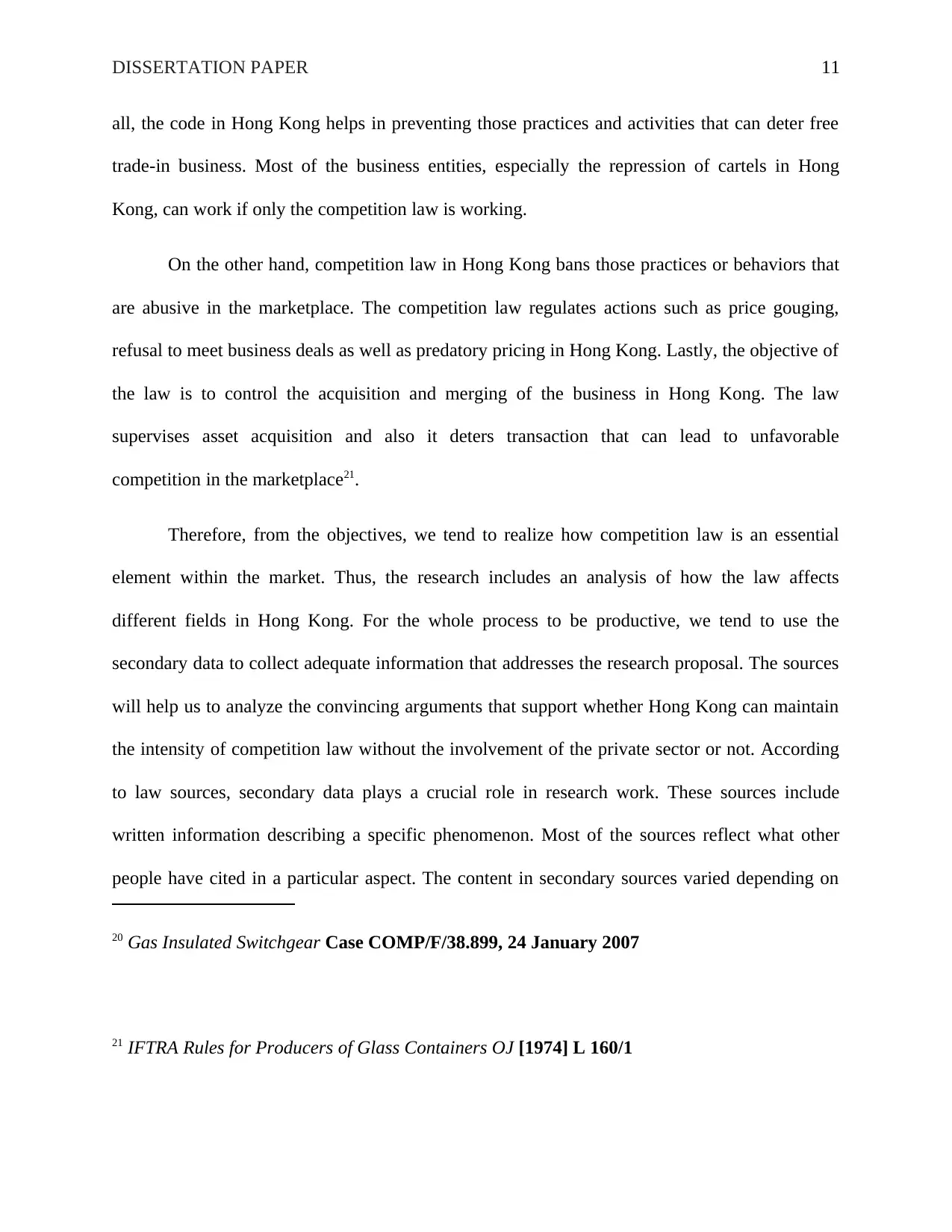
DISSERTATION PAPER 11
all, the code in Hong Kong helps in preventing those practices and activities that can deter free
trade-in business. Most of the business entities, especially the repression of cartels in Hong
Kong, can work if only the competition law is working.
On the other hand, competition law in Hong Kong bans those practices or behaviors that
are abusive in the marketplace. The competition law regulates actions such as price gouging,
refusal to meet business deals as well as predatory pricing in Hong Kong. Lastly, the objective of
the law is to control the acquisition and merging of the business in Hong Kong. The law
supervises asset acquisition and also it deters transaction that can lead to unfavorable
competition in the marketplace21.
Therefore, from the objectives, we tend to realize how competition law is an essential
element within the market. Thus, the research includes an analysis of how the law affects
different fields in Hong Kong. For the whole process to be productive, we tend to use the
secondary data to collect adequate information that addresses the research proposal. The sources
will help us to analyze the convincing arguments that support whether Hong Kong can maintain
the intensity of competition law without the involvement of the private sector or not. According
to law sources, secondary data plays a crucial role in research work. These sources include
written information describing a specific phenomenon. Most of the sources reflect what other
people have cited in a particular aspect. The content in secondary sources varied depending on
20 Gas Insulated Switchgear Case COMP/F/38.899, 24 January 2007
21 IFTRA Rules for Producers of Glass Containers OJ [1974] L 160/1
all, the code in Hong Kong helps in preventing those practices and activities that can deter free
trade-in business. Most of the business entities, especially the repression of cartels in Hong
Kong, can work if only the competition law is working.
On the other hand, competition law in Hong Kong bans those practices or behaviors that
are abusive in the marketplace. The competition law regulates actions such as price gouging,
refusal to meet business deals as well as predatory pricing in Hong Kong. Lastly, the objective of
the law is to control the acquisition and merging of the business in Hong Kong. The law
supervises asset acquisition and also it deters transaction that can lead to unfavorable
competition in the marketplace21.
Therefore, from the objectives, we tend to realize how competition law is an essential
element within the market. Thus, the research includes an analysis of how the law affects
different fields in Hong Kong. For the whole process to be productive, we tend to use the
secondary data to collect adequate information that addresses the research proposal. The sources
will help us to analyze the convincing arguments that support whether Hong Kong can maintain
the intensity of competition law without the involvement of the private sector or not. According
to law sources, secondary data plays a crucial role in research work. These sources include
written information describing a specific phenomenon. Most of the sources reflect what other
people have cited in a particular aspect. The content in secondary sources varied depending on
20 Gas Insulated Switchgear Case COMP/F/38.899, 24 January 2007
21 IFTRA Rules for Producers of Glass Containers OJ [1974] L 160/1
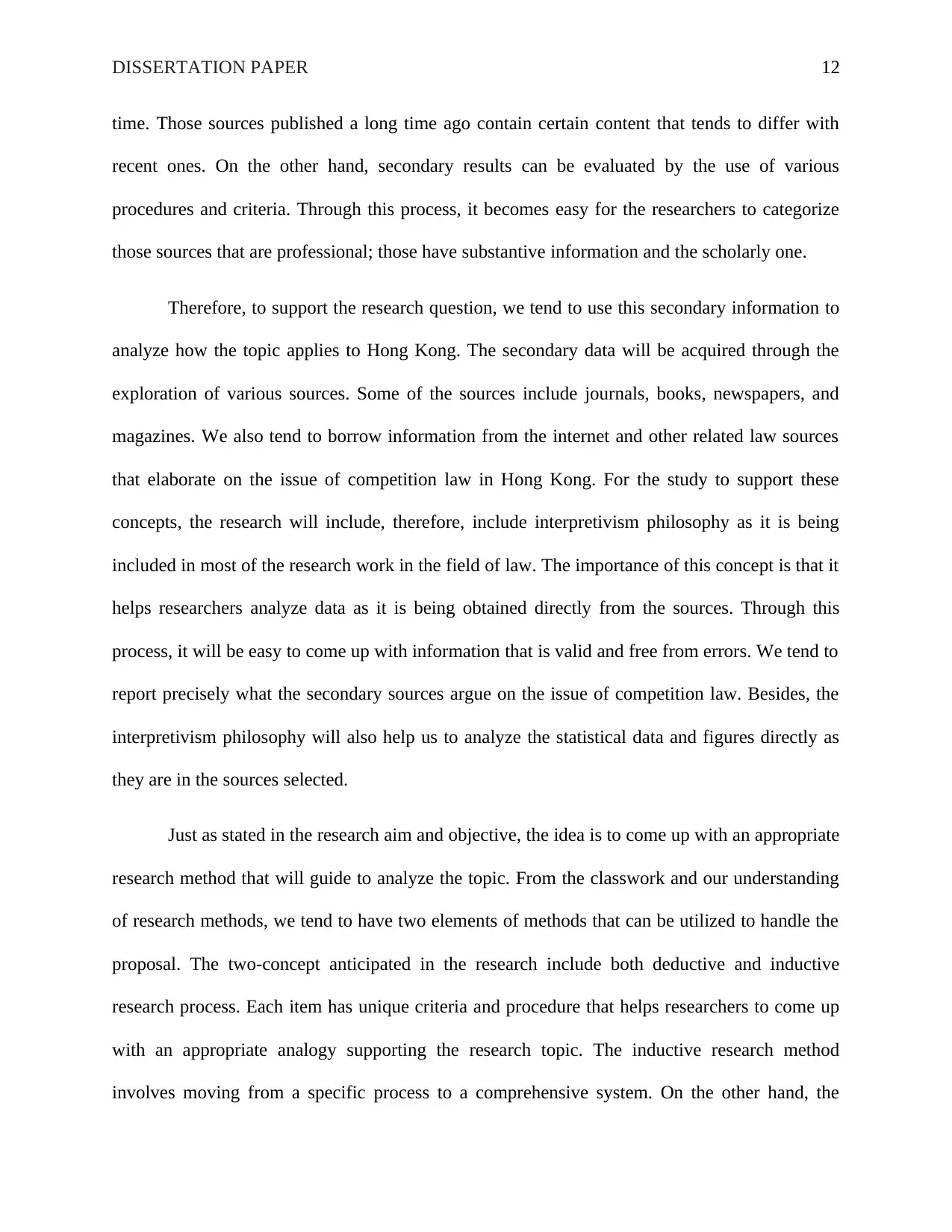
DISSERTATION PAPER 12
time. Those sources published a long time ago contain certain content that tends to differ with
recent ones. On the other hand, secondary results can be evaluated by the use of various
procedures and criteria. Through this process, it becomes easy for the researchers to categorize
those sources that are professional; those have substantive information and the scholarly one.
Therefore, to support the research question, we tend to use this secondary information to
analyze how the topic applies to Hong Kong. The secondary data will be acquired through the
exploration of various sources. Some of the sources include journals, books, newspapers, and
magazines. We also tend to borrow information from the internet and other related law sources
that elaborate on the issue of competition law in Hong Kong. For the study to support these
concepts, the research will include, therefore, include interpretivism philosophy as it is being
included in most of the research work in the field of law. The importance of this concept is that it
helps researchers analyze data as it is being obtained directly from the sources. Through this
process, it will be easy to come up with information that is valid and free from errors. We tend to
report precisely what the secondary sources argue on the issue of competition law. Besides, the
interpretivism philosophy will also help us to analyze the statistical data and figures directly as
they are in the sources selected.
Just as stated in the research aim and objective, the idea is to come up with an appropriate
research method that will guide to analyze the topic. From the classwork and our understanding
of research methods, we tend to have two elements of methods that can be utilized to handle the
proposal. The two-concept anticipated in the research include both deductive and inductive
research process. Each item has unique criteria and procedure that helps researchers to come up
with an appropriate analogy supporting the research topic. The inductive research method
involves moving from a specific process to a comprehensive system. On the other hand, the
time. Those sources published a long time ago contain certain content that tends to differ with
recent ones. On the other hand, secondary results can be evaluated by the use of various
procedures and criteria. Through this process, it becomes easy for the researchers to categorize
those sources that are professional; those have substantive information and the scholarly one.
Therefore, to support the research question, we tend to use this secondary information to
analyze how the topic applies to Hong Kong. The secondary data will be acquired through the
exploration of various sources. Some of the sources include journals, books, newspapers, and
magazines. We also tend to borrow information from the internet and other related law sources
that elaborate on the issue of competition law in Hong Kong. For the study to support these
concepts, the research will include, therefore, include interpretivism philosophy as it is being
included in most of the research work in the field of law. The importance of this concept is that it
helps researchers analyze data as it is being obtained directly from the sources. Through this
process, it will be easy to come up with information that is valid and free from errors. We tend to
report precisely what the secondary sources argue on the issue of competition law. Besides, the
interpretivism philosophy will also help us to analyze the statistical data and figures directly as
they are in the sources selected.
Just as stated in the research aim and objective, the idea is to come up with an appropriate
research method that will guide to analyze the topic. From the classwork and our understanding
of research methods, we tend to have two elements of methods that can be utilized to handle the
proposal. The two-concept anticipated in the research include both deductive and inductive
research process. Each item has unique criteria and procedure that helps researchers to come up
with an appropriate analogy supporting the research topic. The inductive research method
involves moving from a specific process to a comprehensive system. On the other hand, the
⊘ This is a preview!⊘
Do you want full access?
Subscribe today to unlock all pages.

Trusted by 1+ million students worldwide
1 out of 18
Related Documents
Your All-in-One AI-Powered Toolkit for Academic Success.
+13062052269
info@desklib.com
Available 24*7 on WhatsApp / Email
![[object Object]](/_next/static/media/star-bottom.7253800d.svg)
Unlock your academic potential
Copyright © 2020–2025 A2Z Services. All Rights Reserved. Developed and managed by ZUCOL.




